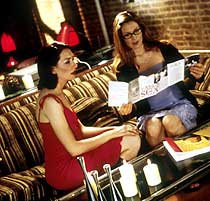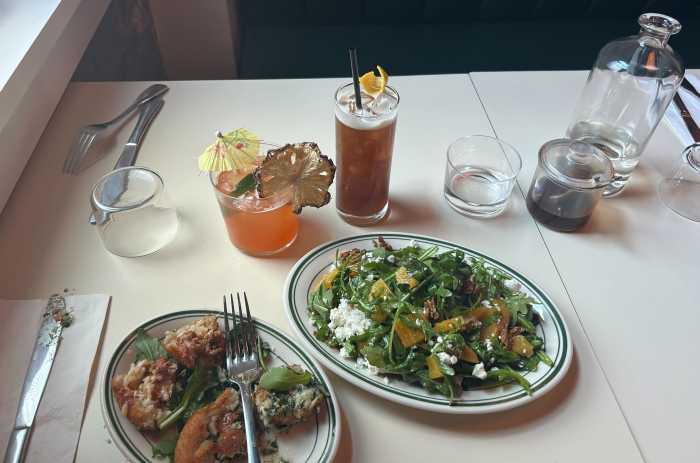You probably haven’t said to yourself lately,
"What the world needs now is another romantic indie comedy
with a quirky gender twist."
But good romantic comedies are all about revitalizing the familiar,
and the new movie "Kissing Jessica Stein" does just
that. Its blend of crowd-pleasing one-liners and emotional authenticity
have already won critical praise and awards at the Chicago, Los
Angeles, Miami and Toronto film festivals.
The film is the brainchild of Brooklyn native Heather Juergensen
and her former theater lab classmate Jennifer Westfeldt. The
pair wrote the screenplay, co-produced the film and play the
lead roles – Juergensen as Helen, a hip, art-world "downtown
girl" and Westfeldt as Jessica, a square, slightly neurotic
"uptown girl." The film follows the odd couple as they
fumble (sometimes literally) through their first same-sex relationship.
On first viewing, the film’s voice seems like a distinctly Manhattan,
post-Woody Allen one, and Juergensen readily acknowledges the
influence of the silver screen’s poet of neurotic New York romance.
But, she adds, "I feel like my Brooklyn roots definitely
gave rise to [my character of Helen] Helen is very much a downtown,
artistic sort of free spirit, definitely the kind you would find
in a place like Fort Greene or Williamsburg as well as where
we had her situated, which was sort of like TriBeCa, SoHo."
Juergensen grew up north of East Flatbush in Prospect-Lefferts
Gardens.
"Artists would move into the neighborhood because houses
were cheaper and there was more of a laid-back vibe than you
could get from other places," she said.
Still, Manhattan was the place for Juergensen to be after school,
pursuing a theater career which gave rise to her current screen
debut.
She and Westfeldt created the prototypes for Helen and Jessica
in a 1996 comedy sketch, which became a play called "Lipschtick."
Its brief, off-off-Broadway run was enough to attract Hollywood
attention, and the partners spent about two years developing
it with a studio. They finally decided to go the classic independent
film route of scrambling for money, scrambling for space and
begging time and favors from friends and family.
"We realized that there were so many cooks in the kitchen
that not only was the pace too slow, but we weren’t all looking
to make the same picture," said Juergensen. "The studio
wanted a little more yuck-yuck, and we wanted the laughs to be,
you know, laugh out loud but always rooted in reality."
Juergensen and Westfeldt even "interviewed many, many women
who had had some permutation of this story two straight women
experimenting and unwittingly being in a relationship together
and then realizing that it was maybe the best relationship they’d
ever had."
They were mindful of the sensitivities that could be jarred by
the premise: "It’s not a secret that this might, for certain
gay people, imply that sexuality is a choice, which to them it’s
not. And yet for many other gay people, being gay falls more
on a continuum of sexuality. It was not lost on us, the complexity
of the issues, and we just wanted to tell a story about two people
connecting."
Despite such serious-sounding implications, the collaborators
were determined to maintain a light touch. In one scene, the
high-strung Jessica, nerve-wracked at the prospect of physical
intimacy with another woman, shows up at Helen’s apartment with
an armload of how-to pamphlets and sex toy brochures ("What
would we do with this one?").
For all their humorous exaggeration, such a moment contains as
much truth about the misunderstandings around sexuality as any
self-serious docu-drama.
The filmmakers’ models included not only Allen, but, says Juergensen,
"’Moonstruck’ and ’When Harry Met Sally,’ some Billy Wilder
films, things that are able to embrace life in all of its messiness
– not necessarily people walking off into the sunset in the conventional
way."
Juergensen isn’t resting on the laurels of the positive buzz
the film has earned so far. The projects she is juggling include
a one-woman show called "Blackwannabe" that she hopes
to mount off-Broadway in the next year. It once again touches
on matters of identity and interpersonal connection but moves
back to her native borough.
"It’s a piece about growing up in Flatbush and very much
about how easy it is for people to get along and how easily the
roots of prejudice can be sown. In my neighborhood, black, white,
everyone looked out for each other, everyone got along. So in
the ’80s, when the crack epidemic started to get bad and you
turn on the TV and you see stuff like Howard Beach – for me as
an adolescent, that was a painful time, because I lived in something
that was kind of a utopia, we thought."
Utopia or not, Brooklyn still inspires Juergensen to gush. "I
remember when Spike Lee made ’She’s Gotta Have It’ [in 1986]
and he showed ferocious devotion to Brooklyn, shown in that beautiful
black-and-white photography of Fort Greene and Fort Greene Park
and the streets and the park benches.
"I’m certain I’m going to write more scripts and make more
movies," she said. "There will be one that takes place
in Brooklyn. It’s very, very near and dear to my heart."
"Kissing Jessica Stein" opens
in Brooklyn on Friday, March 22 at the Pavilion Park Slope (188
Prospect Park West between 14th and 15th streets). Tickets are
$8.50, $5 for seniors and children. The film is also playing
at the Pavilion Brooklyn Heights (70 Henry St. between Cranberry
and Orange streets). Tickets are $7, $3.50 for seniors and children.
For showtimes and ticket information for both theaters, call
(718) 369-0838.

























